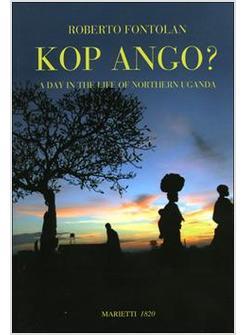Kop ango? Traduzione in lingua inglese. In Northern Uganda one greets another asking: "Kop ango?". This means "what's up" or "is there something?". In essence it means: "is anything wrong?". The conventional answer is: "Kop be". That is: "No, there is nothing wrong". Besides the awkward double negative in the English translation, the meaning is clear: all is fine, we can go on. Among the Acholi people, the day and all relationships start in this way with just a hint of doubt that needs to be dispelled. In this same way the narrative of this books begins, with an exchange of the local greeting as dawn breaks in Kitgum. Thus one enters into the narrative of twentyfour hours in the life of Northern Uganda, a land devastated by war and epidemics. Not unlike many others of Africa's corners, many would say. In any case there is a doubt which is worth investigating:all of us know how Africa dies, but what do we know about how it lives?
GLI AUTORI
Roberto Fontolan è nato nel 1956. Vissuti i primi infuocati anni ’70 al liceo milanese Berchet (il "liceo rosso"), fin dai tempi dell’università si è dedicato al giornalismo. Un’avventura cominciata alla radio ("Supermilano", una emittente libera milanese) e proseguita poi al settimanale "Il Sabato", al quotidiano "Avvenire", alla Rai, dove ha ricoperto diversi incarichi tra cui la direzione del Centro di Produzione di Milano e la vicedirezione del Tg1, alla televisione del gruppo "Sole 24ore", della quale è stato direttore fino al dicembre 2003. Ha realizzato numerosissimi reportage e inchieste in Italia e all’estero, ha curato e organizzato programmi televisivi, ha lavorato nelle pubbliche relazioni e nell’organizzazione culturale. Attualmente si occupa di nuovi progetti di comunicazione e svolge attività di consulenza. E’ docente presso il master di giornalismo all’Università Cattolica di Milano.
